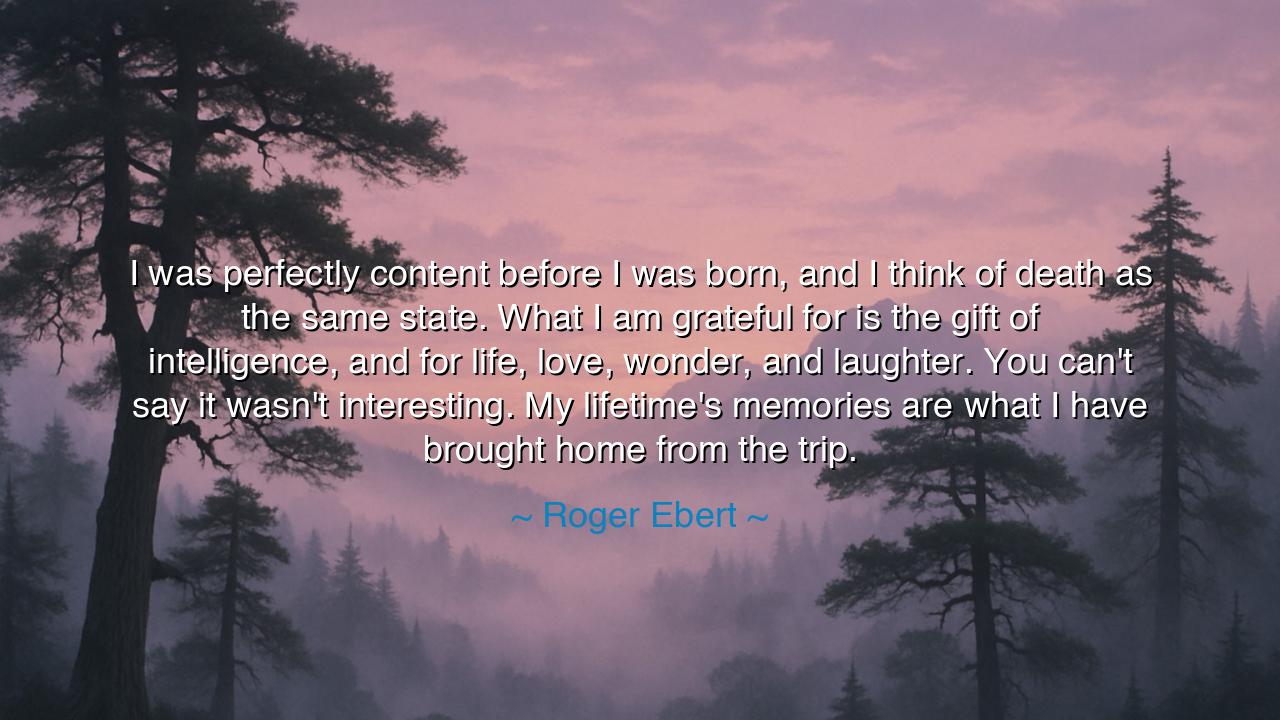
I was perfectly content before I was born, and I think of death
I was perfectly content before I was born, and I think of death as the same state. What I am grateful for is the gift of intelligence, and for life, love, wonder, and laughter. You can't say it wasn't interesting. My lifetime's memories are what I have brought home from the trip.






“I was perfectly content before I was born, and I think of death as the same state. What I am grateful for is the gift of intelligence, and for life, love, wonder, and laughter. You can’t say it wasn’t interesting. My lifetime’s memories are what I have brought home from the trip.” Thus spoke Roger Ebert, the great film critic and lover of life, in the twilight of his days. His words are not a lament, but a hymn—a serene farewell from one who has gazed upon the full panorama of existence and found it beautiful. In this reflection, Ebert reaches the wisdom of the ancients: that life and death are not enemies, but twin realms of being; that gratitude is the highest form of understanding; and that memory, not possessions, is the true treasure we carry beyond the veil.
To be content before birth and after death—what mystery lies in such peace? The wise of old might have called this the harmony of the eternal. For before our arrival, we rested in the silence of the infinite, untouched by pain or desire. And when we depart, we return to that same stillness, as a wave returns to the sea. Ebert saw this not as annihilation, but as completion. He understood that what makes life precious is not its length, but its brief shimmer between two eternities. Between those eternities, we are given a gift: the chance to see, to feel, to wonder—to know love, laughter, and awe. That, he tells us, is enough.
This spirit is not unlike that of Marcus Aurelius, the philosopher-king of Rome, who wrote in his Meditations: “You have existed as a part of the whole. You will vanish into that which gave you birth.” He too found serenity in the acceptance of death, seeing it as a return to nature’s great cycle. Both men—separated by centuries—arrived at the same truth: death is not a thief, but a homecoming. The tragedy is not that life ends, but that we forget to live while it lasts. Ebert’s gratitude is therefore revolutionary, for he refuses fear. He does not ask for more time; he gives thanks for the time he had.
And what a time it was. Ebert, robbed of speech by illness, continued to write with clarity and humor until the end. Though pain shadowed him, he met it with wonder. He celebrated not what he had lost, but what he had gained: understanding, friendship, joy. He could no longer speak aloud, yet his words reached farther than ever before. In his acceptance, there was no bitterness, only light. To live so is to grasp the secret that the ancients sought—to face mortality not with terror, but with reverence. For every ending is but a pause in the greater story of existence.
In his reflection, Ebert speaks also of the gift of intelligence, that divine spark which allows us to perceive and to marvel. He knew that to think, to imagine, to create, is itself a sacred act. The artist, the thinker, the dreamer—all live in gratitude for this gift. To look upon the world with wonder, to laugh amid its absurdities, to love in spite of its sorrows—these are the truest ways of honoring the life we’ve been given. For in such moments, we taste the eternal while still mortal.
Consider the story of Socrates, who, condemned to die, spoke calmly to his disciples. He compared death to a deep, dreamless sleep, or perhaps a journey to another place where the soul might continue to question and learn. Like Ebert, he viewed death without fear, for he had lived in pursuit of truth and had found meaning in the journey itself. Both men knew that the true measure of life is not how long it lasts, but how deeply it is understood, how passionately it is lived, and how gracefully it is surrendered.
So let this be your teaching: be grateful for the trip. Do not dwell upon its end, for all journeys end where they must. Instead, fill the passage between birth and death with love, curiosity, laughter, and kindness. Gather memories as travelers gather keepsakes, not of wealth but of experience. When your time comes to rest again in the eternal silence, may you say, as Ebert did, “You can’t say it wasn’t interesting.” For that is the sign of a life well-lived—one that met the mystery of existence with gratitude, and returned home with peace in its heart.






AAdministratorAdministrator
Welcome, honored guests. Please leave a comment, we will respond soon